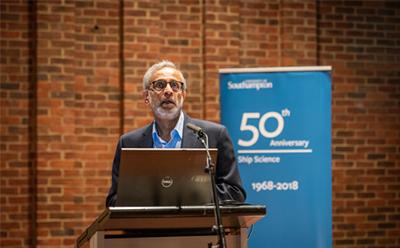International conference marks 50 years of Ship Science at Southampton

Maritime technologies of the future were glimpsed at an international conference marking half a century of Ship Science at the University of Southampton.
Ship Science, Nautical Studies and Maritime Engineering Sciences alumni celebrated Southampton’s global contributions to the maritime industry and highlighted its challenges for the coming decades at the 50th anniversary event.
A diverse range of speakers, including distinguished alumni and senior industry figures, shared their expert insight at the Future Trends in the Maritime Industry conference on Thursday 4th and Friday 5th April.
Professor Stephen Turnock , Head of the Department of Civil, Maritime and Environmental Engineering, said: “Our alumni have made significant and diverse contributions to the maritime industry over the past 50 years and range from: pioneering chief executives in the UK’s resurgent shipbuilding industry; engineering directors overseeing submarines, naval ships and maritime services and entrepreneurs creating new businesses in maritime autonomy and marine renewables amongst many sectors.”.
“It has been inspiring to showcase these achievements at this major milestone, as we continue our mission to equip the next generation of ship scientists with the skills to design, analyse and manufacture the largest and most complex vessels in the field of engineering, operating in one of the most extreme environments on the planet.”
Attendees shared their perspectives on future challenges in autonomy and robotics, rapid design and manufacturing, new fuels and propulsion, defence, energy, commercial shipping and shipbuilding and high speed craft in sessions on Highfield and Boldrewood campuses and Southampton Football Club.
Highlights of the many Ship Science activities at Southampton over the past half century have included the co-location of the Lloyd’s Register Global Technology Centre on the Boldrewood Innovation Campus in 2014 and the cutting-edge research from the Performance Sport Engineering Laboratory (PSEL) leading to a Queen’s Anniversary Prize in 2012. The Laboratory’s expertise in fluid dynamics and instrumentation as well as its application to system design and equipment selection has contributed to British success in winning gold medals at the Olympic Games in Beijing, Vancouver, London, Sochi, Rio and Pyeonchang.
Today, Ship Science courses at Southampton specialise in Naval Architecture, Marine Engineering and Autonomy, Ocean Energy and Offshore Engineering and Yacht and High Performance Craft, with students having access to a 138m towing tank and teaching from Wolfson Unit consultants as well as support from a worldwide network of influential alumni. The portfolio of courses, accredited by the Royal Institution of Naval Architects (RINA), Institute of Marine Engineering, Science and Technology (IMarEST) and Institution of Mechanical Engineers (IMechE), still remain true to the original ethos of taking a first principles approach to the science and engineering of ship and structures that operate in the oceans.